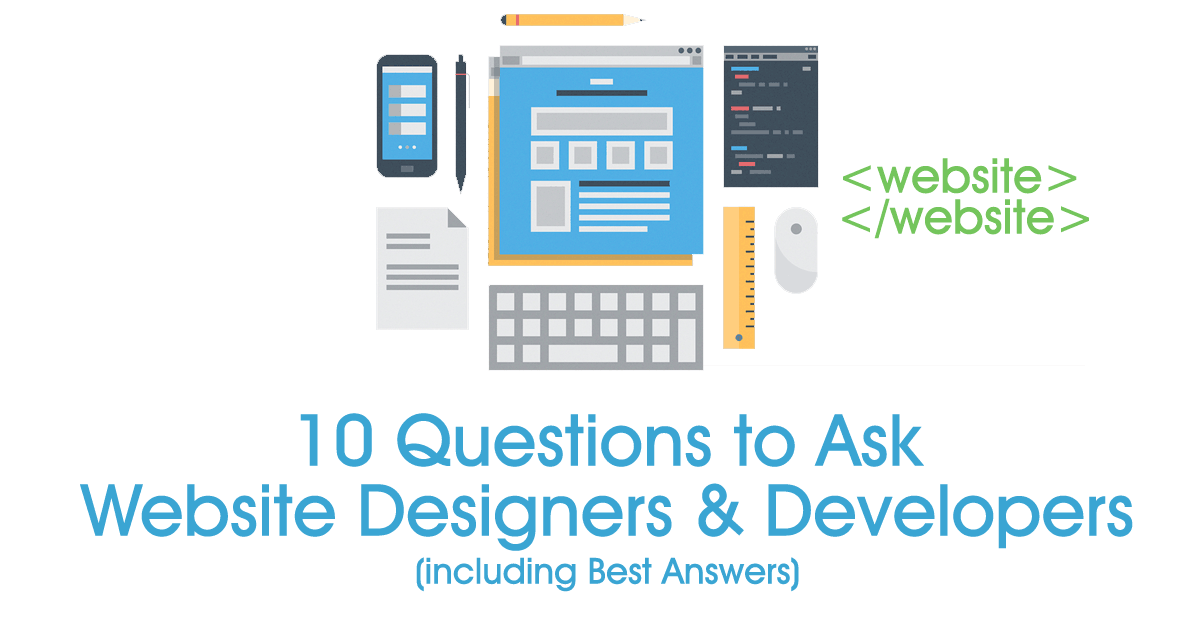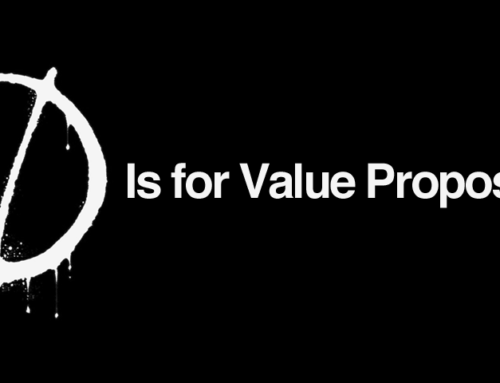[vc_row][vc_column][vc_column_text]Want to make sure you find the right web designer or website developer for your new project? Interview them with our 10 Questions to Ask Website Designers & Developers, and pay close attention to their responses. To make it easier for you, we’ve included what we consider the Best Answers.
1. What is your approach to a website development project?
Anyone who has been developing websites for more than a few days should have a process. As a matter of fact, they probably have it described in their marketing materials (easily accessible) if they’ve been in business for any length of time. IT’S WHAT YOU’RE REALLY PAYING FOR. Sure, you get a website, but the process of creating the website or web application separates the poseurs from the professionals.
Best Answer:
“Great question. Here’s a description we send to the potential clients when they ask…” //insert well-designed marketing collateral here!//
2. Have you done any work similar in functionality or size like ours? Can you show me any examples of projects with similar goals?
Your project will be difficult if you’re a small company hiring a big firm (and maybe a big company hiring too small of a firm). It’s OK for a company to stretch a bit one way or the other, but if the alignment is too far off, results can suffer.
Best Answer:
“Definitely. We work with companies like yours all the time – check out our portfolio, especially Project X and Project Y.”
3. When will you start, how long will the project take and who will be managing our account?
“Add it to the queue” can be a scary prospect – projects typically take longer than promised, so get a feeling for how long they anticipate before starting and how long they estimate the project to take. It’s rarely accurate but gives some idea for expectation. And as we mentioned in our earlier post about hiring a great website development firm, sometimes you’re the victim of bait & switch: the team selling you a website is a nice storefront, but the team building the site aren’t even part of their company. That is, there’s a fair number of companies that offshore the work, and you didn’t know about it.
Best Answer:
“We have different team members that handle tasks on your project. Your project manager will be Steven, and he’ll contact you within a day or two of you signing the agreement. We earn our living by delivering results, so when Steven gets a chance to speak with you and our developers, we’ll provide as accurate a timeline as we can. The scope of your project and the timing with other projects are both critical factors.”
4. Do you use a content management system? What are the advantages and disadvantages?
A content management system (CMS) gives you the ability to make your own changes when the site is live. Need to add a photo, calendar event or blog post? That’s in the CMS. If you’re not technical, you at least need to remember that “technology platforms matter”. It’s the engine that runs your online business, so it needs to work fast, be flexible and be easy to manage by you later. We’ve seen some awful implementations – we call it “cowboy code” – that no one other than the original programmers can even touch. Using standard technology platforms and clean programming tools ensures a longer lifespan for your investment. The web development firm should be able to explain why their particular platform works well for you.
Best Answer:
“Yes, we’ve been building some sites with WordPress and we do custom work using PHP/Laravel. WordPress is used by almost a third of all websites, so it’s a powerful CMS. Even when we build something more specialized, we use a popular programming framework. Our programming is all clean, standardized and fast!”
5. Do you factor in search engine optimization in your design process?
Gone are the days when websites can be built using Lorem Ipsum (or Samuel L. Jackson Ipsum or Bacon Ipsum). Content drives design more than ever before, so make sure you aren’t replacing dummy text right before launch. During design, you should be providing content plans. Full stop.
Best Answer:
“Definitely. We’ll start with our own research, then come back to you with ideas – together we’ll form a content plan for the overall site. I have to warn you, though, that you’ll have some work to do too. We’ll work with you to make sure it’s all good for proper SEO. We want you to have tons of traffic and grow!”
6. What do we need to do?
As mentioned in question 5, some responsibilities will fall back on you, the website owner. Make sure you know what you should be doing – if there are tasks (such as content gathering) that you are supposed to manage, you want to know what is expected and when it is needed.
Best Answer:
“In the first meeting with your account manager, we’ll provide a proposed project plan. We’ll highlight your tasks and tell you when we need things.”
7. Will the website be responsive on mobile devices and tablets?
Google has updated their search model to place a value on being mobile-friendly. For many websites, half the traffic comes from mobile devices. Some older sites are dropping in the rankings – Google sees that they didn’t display well on smaller screens. If you’re building a new site or having a website makeover, make sure to ask about being “responsive” (geek talk for having a site that works on all sizes of screens, from phones to big televisions).
Best Answer:
“Yes.”
8. When the site is complete, will you provide training? What happens if there are technical problems after going live? What other services do you provide?
Your website, if properly designed, will be updated regularly. You should update at least once a month (it helps with search engines), whether an event calendar, blog post, product change or news story. If you’re going to update it, you need to know how to do it. Training (and perhaps even a User Guide) will be instrumental. Unfortunately, there will be problems after the site goes live, so know what the process will be with your vendor. Find out if there is a warranty period or a maintenance agreement to cover issues.
Best Answer:
“Before the site goes live, we’ll walk you through how to manage the content. It’s pretty easy, but we will make sure you understand it. We offer a 30 day warranty for any problems that arise in the new site. After that, we charge between $50 and $200 per hour for changes. We’ll issue a change request with a time & cost estimate for each item ahead of any work.”
9. How much will it cost? How do your price your services?
The moment of truth. Some projects can be done as fixed price (with a clear project scope), while others are more likely to be charged hourly. Even though money is a dirty subject in business, you have to talk about the fees. Don’t waste your time or the vendors’ if you can’t set a realistic scope and budget. If you want a $500 website, tell the vendor up front. If you budget based on estimates that come back from a few vendors, tell each of the bidders about it. Make sure you have a clear explanation for work outside the project’s initial scope.
Best Answer:
“Building a website is like building a house. We prefer fixed price projects. We will lock down the project requirements, set a budget and start work. If you have changes, we’ll provide estimates along the way. You can decide if they’re worth additional fees.”
10. Tell us about your company. How long have you been in business?
You should feel confident that the selected vendor can deliver your project. If you need comprehensive design, development, and marketing services, make sure they can do everything. Verify that they are staffed with professionals or reliable partners. A reputable agency’s fees will be different from a freelancer working out of a tiny office with a ‘team’ halfway around the world. We believe in like-to-like. If the vendor’s team is too large, you run the risk of getting lost in their shuffle, with little personal attention. If the vendor’s team is too small, you run the risk of delays, lack of skills, or (yikes!) company closure. You should feel comfortable throughout the process. It’s also important to know what types of clients the vendor usually services and what the results were. It’s indicative of customer support to know how long their relationships have been in place.
Note, portfolio is a telling sign of a website vendor.
Best Answer:
“We’re a small team that tackles big projects. We started working on website projects in the 90s, and we continue to evolve with the market. We try to push ourselves as much as possible, but we know when to tell folks we’re not the right fit. Our growth comes from the growth of our customers, so we try to find the projects that fit us.”
Download Our 10 Questions to Ask Website Designers & Developers
Here’s a printable version you can use while you’re on the phone (or copy & paste the questions into an email…).[/vc_column_text][/vc_column][/vc_row][vc_row bgcolor=”#ffffff”][vc_column align=”center”][vc_btn title=”Get The List!” style=”flat” color=”green” align=”center” i_icon_fontawesome=”fa fa-arrow-circle-down” link=”url:http%3A%2F%2Ftwistedpuppy.com%2Fdownload%2FTwisted%20Puppy%20-%2010%20Questions%20for%20Web%20Designers%20or%20Developers.pdf||target:%20_blank” add_icon=”true” css=”.vc_custom_1458347186538{padding-top: 5px !important;padding-right: 5px !important;padding-bottom: 5px !important;padding-left: 5px !important;}”][rs_space height=”20px”][/vc_column][/vc_row]







Leave A Comment